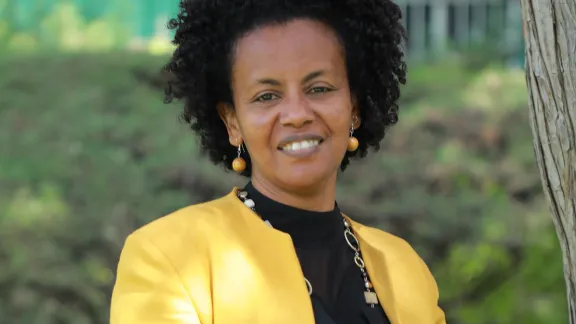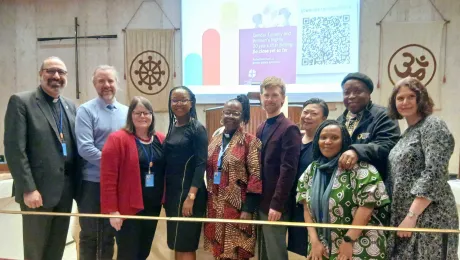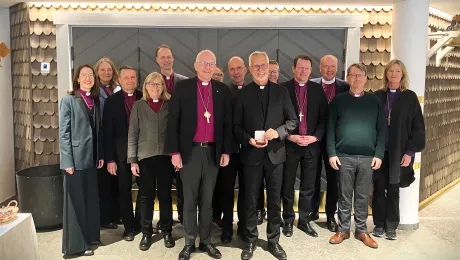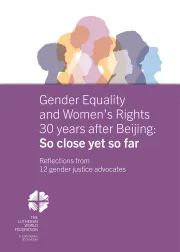“It’s a God-given opportunity and at the same time a challenge, because in our context not many women are in leadership positions,” says Dr Ebisse Gudeta, the first female academic dean of the Ethiopian Evangelical Church Mekane Yesus seminary

Dr Ebisse Gudeta, academic dean of the Ethiopian Evangelical Church Mekane Yesus seminary. Photo: Mekane Yesus Seminary
Voices from the Communion: Dr Ebisse Gudeta, first female dean of the Ethiopian Evangelical Church seminary
(LWI) - Appointed as dean just a couple of months before the start of the COVID-19 pandemic and a year before flash floods that killed 8 people in the seminary, Dr Ebisse Gudeta is a champion for women in the c, one of the fastest growing churches within the Lutheran World Federation (LWF).
With a Masters in migration and transnational networking and a PhD in confirmation ministry in her church, she believes it is possible to overcome the many barriers that women and girls continue to face in accessing education and job opportunities, especially in her African context.
In March, she travelled to New York to be part of the LWF delegation to the UN’s Commission on the Status of Women which is looking at the economic empowerment of women and financing with a gender perspective. In between sessions, she talked about her journey and the people who have supported her along the way.
What does it mean to you to be the first woman serving in your position?
It is a God-given opportunity and at the same time a challenge, because in our context not many women are in leadership positions. I heard that many senior leaders were not happy when I was appointed and said the college would collapse, but thanks to God it has flourished.
My appointment was just before COVID and that was a really challenging time because we didn’t have the infrastructure or internet to reach the majority of our students who live in the countryside. But we prepared modules to send to them and were able to finish the academic year successfully.
How badly were you and your family affected by the floods in 2021 that killed eight people?
It was devastating, traumatic. In just three minutes the whole compound was flooded by a wave of icy, dirty water and we lost those dear friends who were like family to us. I lost everything but I am thankful to the Lord because my two children, my mother and my cousins who lived with me were saved and life is more precious than anything.
It took a long time to recover because my two boys, then aged 5 and 8, were in the water for more than 2 hours until they could be rescued. The water went into their mouths and ears and they developed a kind of allergy and infections, so it took almost two months until they recovered from their sickness.
We had one trauma healing session, where we were encouraged to share our grief and cry for our friends and my children drew pictures about their experience – that helped a lot. But it has not been easy and still now, when I hear the rain starting, I want to run to my children.
Take us back to the beginning of your story and when you first felt called to work in the church?
My family are Christian, we were two girls and four boys, but I grew up seeing my brothers allowed to play outside all the time while I had to be inside helping my mum. We had our extended family, aunties and uncles, living with us and I could see the burden on my mum, having to cook and care for them all. She was good at school but left in 9th grade to raise us. Economically, she is totally dependent on my dad and has to ask him for anything she needs.
I didn’t like that and I wanted to get a good job to help my mum. I knew I didn’t want to be dependent, so I prayed, day and night, as I wanted to be a minister in the church. I was a choir member and in the drama group, as well as a voluntary preacher because I had a love for the word of God. We had a Bible in the house, which was very precious to my mum, so when she left the house I would read it and make notes, taking care to put it back in its place before she came home.
As a young woman, how difficult was it to get into higher education?
People in my congregation wanted to send me to the seminary to study but there was no funding. Then they opened a night Bible school for voluntary workers to study everything from the history of the church to Lutheran theology and practice. I came first in the class and so got into the seminary that way.
First, I studied leadership and management and then did 4 years of theology, graduating in 2005. I came back home to serve my synod but there were no vacancies, so I started working for free. Then I became the coordinator of women’s ministry, travelling to parishes in the countryside to do training, before getting a scholarship to do a Masters in Germany.
In the meantime, you also got married, didn’t you?
Yes, I got married just before going to Germany and I was under a lot of pressure to start a family. But the vice-president of the seminary, where I was working in the college of theological studies, encouraged me to apply for a scholarship to study in Norway, where they were looking for younger candidates. I was the only woman applying but a couple of months later, I heard they had accepted my application. I went to Norway to begin my PhD. It was a sandwich program, so I didn’t have to stay there, but it was challenging because of the lack of good internet connections in Ethiopia.
I also gave birth to my two sons during that time and my husband left to work in the U.S, so I was looking after my kids and working as well. I was a full time PhD student until 2020, after my appointment as dean, but I thank God and also our seminary president, Rev. Dr Bruk Ayele, who believes in the potential of women and supported me, even though so many people were not happy with his decision.
What are some of the successes you have achieved since your appointment?
Together with Dr Bruk, we have worked hard to find scholarships for female students. Over the past decade, we never had more than 20 or 25 women enrolled in seminary but now we have 100 women studying theology out of 350 students in our regular in-person programs. When I did my Bachelors, we were only 2 women in the class, so this is a huge change.
In 2020, we had a young MA student who brought her small child with her, so we gave her a room of her own, but I realized that we needed a safe space where women could leave their children during the day to study in peace. Thanks to our partners, we were able to build a nice daycare center, which is home to the children of 8 student mothers but also other workers, like our cleaners who used to work with their kids on their backs.
I also insisted on women in our distance learning programs having scholarships to help them study, so that is another success we have achieved. Also, we started a circle of female theologians, where we pray together and do mission work like visiting prisoners and collecting clothes or hygiene products for them.
How many of your students are able to find work when they finish studying?
It is very difficult, most of them cannot get employment, but the church uses their time and talents on a voluntary basis. There is so much work to do because we have no women in top leadership positions in the church.
But my door is always open to listen and encourage all our students. I tell them to be bold, to join hands and support each other, which doesn’t always happen because the door for women to enter is so narrow. We need to open that door and also work on promoting positive masculinities. I know that change will not come overnight, but if we work hard, we can overcome the challenges.
Finally, what does it mean for you and your work to be a part of the global communion of churches?
It is so important – what are we able to do on our own? The church belongs to Christ and exists through our partnerships. At the seminary, we really appreciate our relations with the LWF which give us a bigger picture. I see other bold, strong women in leadership and it gives me energy and courage to continue in my work.


